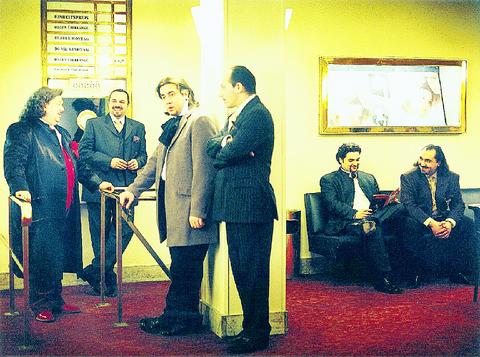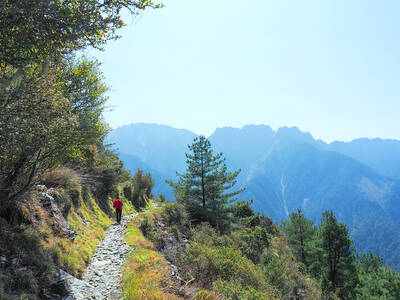Roby Lakatos and his ensemble has, in the past two years, found themselves in great demand in Asia, especially Korea and Japan. Despite their busy touring schedule, the seven musicians will manage to stop by Taipei for a concert Sunday.
The 38-year-old violinist is a seventh-generation direct descendant of the legendary Hungarian gypsy violinist Janos Bihari (1764-1827). Dubbed "King of the Gypsy Violinists" and "Hungarian Orpheus" by the likes of Franz Liszt and Ludwig van Beethoven, Bihari shaped the development of violin music at his time and his descendents went on to influence Gypsy violin music through the centuries.
Being born into such a musical family meant that Lakatos had an early start in music. At the age of five he was already studying under the late master gypsy violinist Sandor Lakatos -- an uncle -- and his father, jazz saxophone player Tony Lakatos. At nine, he gave his first public concert. Although Lakatos learned music mainly in his family, he also studied classical violin at the Bela Bartok Conservatory in Budapest, where he won the first prize in 1984.

Lakatos and his ensemble performed at Belgium's famous jazz club Les
Ateliers in Brussels from 1986 to 1996, steadily building up a reputation for astounding violin technique. Sir Yehudi Menuhin was a frequent guest at his shows.
As Lakatos' popularity has grown, his fans have not had the chance to see him perform at such intimate venues, as demand to see him perform keeps his schedule packed with some of the world's biggest venues. Lakatos has performed at the Ludwigsburg and Schleswig-Holstein Festivals, at London's Elizabeth Concert Hall and at New York's Central Park with the Orchestre National de Radio France and Dresden Philharmonic.

PHOTO COURTESY OF DADA
Lakatos' first visit to Taiwan was in 1999 as part of his Asian debut. His concert transformed the rather solemn National Concert Hall into a relaxing cabaret. What amazed the audience in particular were his strumming, pizzicato and playful effects, all achieved seemingly without effort. Lakatos' appeal lies his ability to interpret, arrange and compose music of various genres in his own particular style. His repertoire includes Hungarian folk songs, classical numbers, jazz compositions, Moorish melodies as well as Italian operas. Lakatos' signature fusing of different styles has been viewed as quintessentially gypsy, while his unconventional performing style won him the nickname "devil's fiddler."
In classical music, he has collaborated with the young Russian violinist Vadim Repin. He also worked with the late French jazz violinist Stepane Grappelli, to whose inspiration he attributed his improvisational skills. Lakatos has also worked with Argentine clarinet player Giora Feidman, American jazz pianist Herbie Hancock, and jazz trumpeter Randy Brecker.
Deutsche Grammophon signed him on after listening to just one performance back in 1998. The next year, Zubin Mehta invited him as a guest performer in the production of Fledermaus at the Bayerische Staatsoper Munich after hearing Lakatos' performance for the first time. Lakatos' first recording was 1991's In Gypsy Style, though he did not make many recordings until after he joined Deutsche Grammophon. 1998's Lakatos is composed of arrangements of works by Brahms, Khachaturian, Russian folksongs and his own compositions. It also features the theme from Schindler's List by John Williams, which was wildly popular when he performed it last time in Taipei. It won the prestigious German Echo-Klassik Award in 1999.
His second CD Live from Budapest, released in 1999, secured his status as a violin virtuoso. The performance combines jazz, gypsy idioms, contemporary and classical styles with much interesting improvisation.
If Lakatos' concert on Sunday is going to be like his last in Taipei,
audiences can expect a breathtaking evening followed by several standing ovations. The show not only went very well with the audience but received rave reviews here. "Lakatos strums the violin with his left hand with devilish savvy. This skill was enough to make classical violinists gasp and make their jaws drop," said Music Monthly. (音樂月刊) "His breathtaking skills and unbelievable pace, made well-worn tunes sound spanking new," said classical music critic Guo Chi-hao (郭志浩).
Lakatos and the six musicians in his ensemble will perform tracks from their latest album -- As Times Goes By, which was released last August. Tracks on this selection of movie themes encompasses many decades. They include all-time favorites like the theme from Casablanca, The Godfather, Fiddler on the Roof, Once Upon a Time in America, The Third Man, and more recent movies like Chocolat.
At Sunday's concert, Lakatos will be performing with Kalman Cseki on piano. Cseki was Lakatos' friend from youth, when Sandor and Tony Lakatos worked with Ceski family members. Like Lakatos, Ceski carries on the gypsy music tradition in his family. Apart from piano, he also plays the cymbalon, a traditional instrument.
Although the concert is titled I'm Very Ugly, But I'm Also Very Good, (
What: Lakatos -- I'm Very Ugly, But I'm Also Very Good
When and Where: Sunday 7:30pm at the Sun Yat-sen Memorial Hall, Taipei
Tickets: NT$400 to NT$1,500 from ERA ticketing outlets

“Why does Taiwan identity decline?”a group of researchers lead by University of Nevada political scientist Austin Wang (王宏恩) asked in a recent paper. After all, it is not difficult to explain the rise in Taiwanese identity after the early 1990s. But no model predicted its decline during the 2016-2018 period, they say. After testing various alternative explanations, Wang et al argue that the fall-off in Taiwanese identity during that period is related to voter hedging based on the performance of the Democratic Progressive Party (DPP). Since the DPP is perceived as the guardian of Taiwan identity, when it performs well,

The Taiwan People’s Party (TPP) on May 18 held a rally in Taichung to mark the anniversary of President William Lai’s (賴清德) inauguration on May 20. The title of the rally could be loosely translated to “May 18 recall fraudulent goods” (518退貨ㄌㄨㄚˋ!). Unlike in English, where the terms are the same, “recall” (退貨) in this context refers to product recalls due to damaged, defective or fraudulent merchandise, not the political recalls (罷免) currently dominating the headlines. I attended the rally to determine if the impression was correct that the TPP under party Chairman Huang Kuo-Chang (黃國昌) had little of a

At Computex 2025, Nvidia CEO Jensen Huang (黃仁勳) urged the government to subsidize AI. “All schools in Taiwan must integrate AI into their curricula,” he declared. A few months earlier, he said, “If I were a student today, I’d immediately start using tools like ChatGPT, Gemini Pro and Grok to learn, write and accelerate my thinking.” Huang sees the AI-bullet train leaving the station. And as one of its drivers, he’s worried about youth not getting on board — bad for their careers, and bad for his workforce. As a semiconductor supply-chain powerhouse and AI hub wannabe, Taiwan is seeing

Jade Mountain (玉山) — Taiwan’s highest peak — is the ultimate goal for those attempting a through-hike of the Mountains to Sea National Greenway (山海圳國家綠道), and that’s precisely where we’re headed in this final installment of a quartet of articles covering the Greenway. Picking up the trail at the Tsou tribal villages of Dabang and Tefuye, it’s worth stocking up on provisions before setting off, since — aside from the scant offerings available on the mountain’s Dongpu Lodge (東埔山莊) and Paiyun Lodge’s (排雲山莊) meal service — there’s nowhere to get food from here on out. TEFUYE HISTORIC TRAIL The journey recommences with